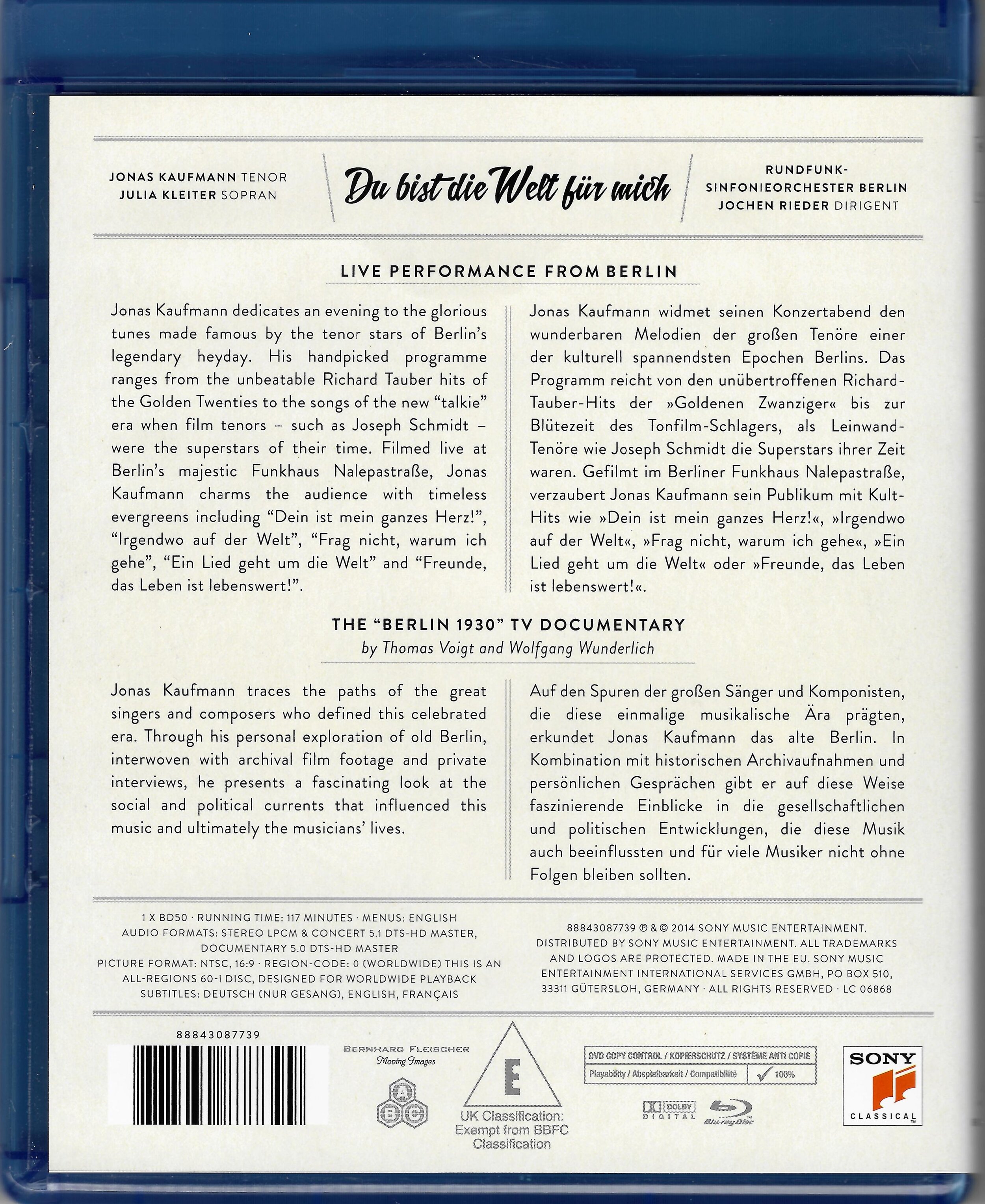

Jonas Kaufmann - Du bist die Welt für mich concert. Features guest star Julia Kleiter (Soprano). In 2014, Jochen Rieder conducts the Rundfunksinfonieorchester Berlin (The Berlin Radio Symphony Orchestra). Directed for TV by Andy Sommer; produced by Bernhard Fleischer. Sung in German. Released 2014, disc has 5.1 dts-HD Master Audio sound. Grade: A
Here is the program for the live performance in Berlin called Du bist die Welt für mich:
Franz Lehár - Freunde, das Leben ist lebenswert! from Giuditta
Emmerich Kálmán - Grüß mir mein Wien from Gräfin Mariza
Robert Stolz - Frag nicht, warum ich gehe from Das Lied ist aus
Hans May - Ein Lied geht um die Welt
Robert Stolz - Im Traum hast du mir alles erlaubt from Liebeskommando
Ralph Benatzky Es muss was Wunderbares sein from Im weißen Rössl
Richard Tauber - Du bist die Welt für mich from Der singende Traum
Mischa Spoliansky - Heute Nacht oder nie from Das Lied einer Nacht
Werner Richard Heymann - Irgendwo auf der Welt from Ein Blonder Traum
Franz Lehár - Hab' ein blaues Himmelbett from Frasquita
Franz Lehár - Gern hab' ich die Frau'n geküsst from Paganini
Franz Lehár - Dein ist mein ganzes Herz! from Das Land des Lächelns
Erich Wolfgang Korngold - Glück, das mir verblieb from Die tote Stadt (with Julia Kleiter)
Paul Abraham - Reich mir zum Abschied noch einmal die Hände from Viktoria und ihr Husar (with Julia Kleiter)
Paul Abraham - Diwanpüppchen from Die Blume von Hawaii (with Julia Kleiter)
This is a nostalgia trip into the “golden age” of operetta and movie music popular in Berlin in the 1930s. The concert runs 65 minutes. In addition, there is a good documentary (52 minutes) about the era and the work Kaufmann did to prepare for the concert. The screenshots below come from the concert and the documentary. Cultural landmarks relating to this frothy time were the 1930 movie Der Blaue Engel starring Marlene Dietrich and the writings (later) of Christopher Isherwood in his Berlin Stories, which became the inspiration for the musical Cabaret. This era ended with the rise of Adolf Hitler in 1934, and the documentary also tells what happened to many of the composers and singers after that.
Kaufmann decided to stage the concert at the old, restored Radio Studio Hall because of the fabled acoustics of that venue:
The auditorium was designed primarily for sound fidelity, but it has room for a small live audience. Kaufmann assembled a huge orchestra augmented with banjos and a steel guitar.
Kaufmann engaged in extensive research into the music of the 1930s and discussed the era with survivors of the famous singers of the time:
Kaufmann enlisted his favorite opera conductor, Jochen Rieder, in the project and gave him, it seems, plenty of rehearsal time:
And to insure a great performance, there’s nothing like having a live audience, seen next below from the stage. The crowd was mostly female, and the brunette lady in the middle of the front row got a lot of attention from the cameramen. I wonder who she is.
Kaufmann and the orchestra together are terrific. Below from the title song, “You are the world for me.”
Next below from “Heute Nacht oder nie” (“Tonight or Never”), “Toright I’m going to ask, if you will give me your love.”
My favorite image from this disc is this lucky little girl sitting in her mom’s lap. She’s learning fast—knows how to blow a kiss:
Most of the songs express longing, desire, and devotion. But the range is great. In “Gern hab’ ich die Frauen geküsst” (Gladly I kissed them all), the rake shows little remorse:
Kaufmann has long been one of the world's leading opera tenors. He can move over into operetta and high-class show songs without sounding stilted. He can easily keep your attention and admiration through 15 songs solo. But in a stroke of genius he added Julia Kleiter in the last 2 numbers and the encore. Jonas and Julia together are adorable. For a dramatic change of pace, they lead off with Korngold’s duet from Die tote Stadt, “Glück, das mir verblieb.” This remains maybe the most potent tear-inducing song ever written and it moves this entire program to a higher level. It is “The song of a true love”:
That must die:
Next comes another almost unbearably sad song of parting from Paul Abaham: “ Reich mir zum Abschied noch Einmal de Hände” (“In parting, give me your hands one last time.”):
And now that you’ve got everyone weeping, hit them with the jaunty, arch Divan Dolly song. So what exactly is a Divan Dolly? Well, the only thing I’ve learned for sure is that she has a heart made of sawdust:
Sony did a poor job of promoting this title in 2014-15 when it came out. I couldn’t figure out what it was about, so it didn’t make it to my buy list. In 2015 it earned Kaufmann the Echo-Klassik “Singer of the Year” award. ArkivMusic gave the CD version its Recommended designation. So I finally bought it just to see what the heck is in it. I originally gave this an A+ because I thought it was so well put together. I’ll still give the singers, the orchestra, the program, and the sound recording an A+. The video resolution is not at A+ level, probably due to weak lighting in this radio-friendly venue; but maybe slightly soft PQ is appropriate for a nostalgia trip. Alas, the video pace is too fast, and I’m dropping back to just an A.
We usually exclude operetta and movie music from this website, but with singers this good, and all the work Kaufmann and Rieder put into this, we make an exception.
OR
















